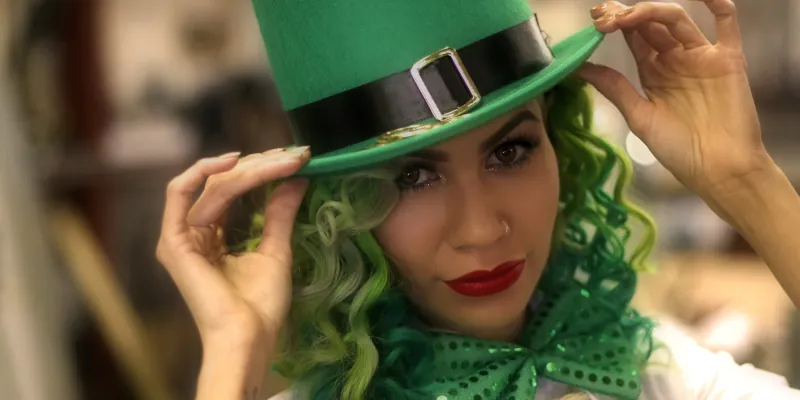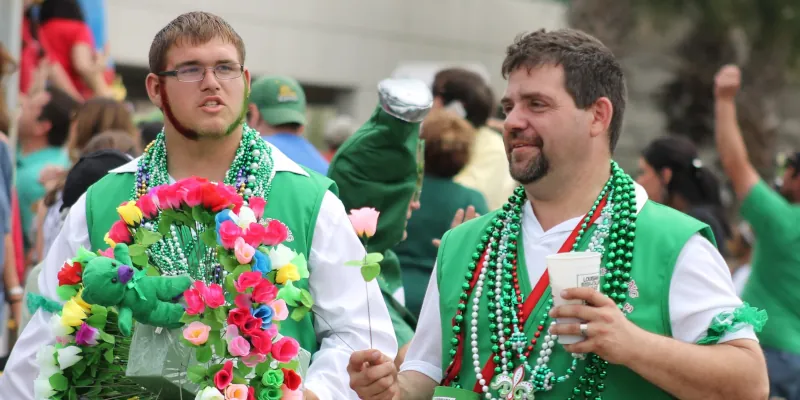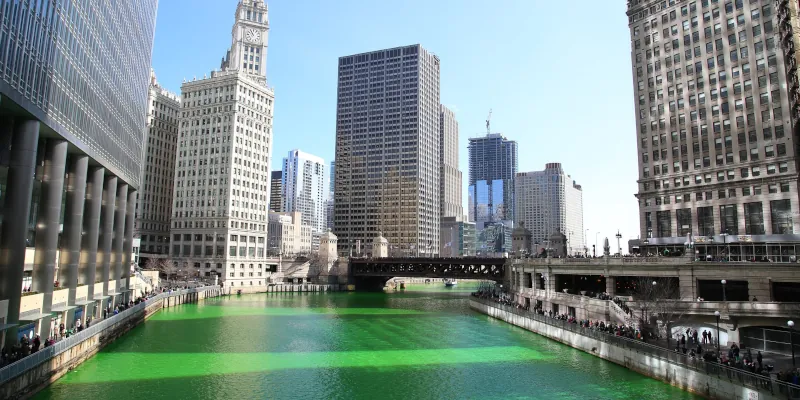Mastering English on St. Patrick's Day
Improve your English with a touch of Irish!
What is St. Patrick's Day?
[Last updated on 15/03/2023]
St. Patrick’s Day is a cultural and religious celebration that is observed annually on March 17th. It is the feast day of St. Patrick, the patron saint of Ireland, and it is celebrated not just in Ireland, but all around the world.
We take a look at the history and origin of St. Patrick’s Day, and how it is celebrated in Ireland and in English speaking countries worldwide. To give you an insight of the Irish influence on the English language, we also put together a list of Irish expressions that are commonly used in English today.

Origin and History of St. Patrick's Day
St. Patrick’s Day originated in Ireland and has been celebrated for over 1,000 years. It commemorates St. Patrick, the patron saint of Ireland, who is credited with bringing Christianity to the Irish people. He was born in Roman Britain in the 4th century and captured by Irish pirates at the age of 16. Taken to Ireland as a slave, he worked as a shepherd for six years. During this time, he became deeply religious and turned to Christianity for comfort. After escaping from captivity, he became a priest and returned to Ireland to spread the word of God.
St. Patrick is said to have used the shamrock, a three-leaved plant, to explain the concept of the Holy Trinity to the Irish people. The shamrock has since become a symbol of St. Patrick’s Day and Ireland itself.
St. Patrick’s Day was originally a religious holiday and was only a minor celebration in Ireland until the 17th century. Then, it was made an official feast day and has been celebrated as a national holiday ever since.
How is St. Patrick's Day is celebrated in Ireland?
St. Patrick’s Day is celebrated in Ireland with parades, music, dance, and lots of green. The main parade in Dublin is the highlight of the day and attracts visitors from all over the world. The parade features floats, dancers, musicians, and performers, and is a spectacle not to be missed.
In addition to the parade, many Irish people attend church services on the day to honour their patron saint. It is also a day for family gatherings, and many people will enjoy a traditional Irish meal of corned beef and cabbage.

How is St. Patrick's Day is celebrated around the world?
England
While St. Patrick’s Day is not a public holiday in England, it is still a popular day for people to come together, have fun, and celebrate Irish culture. Many cities in England, including London, Manchester, and Birmingham, host parades and festivals.
The biggest parade in England is held in London, and it is a colourful and festive event that attracts thousands of people each year. The parade starts in Piccadilly and ends in Trafalgar Square, and features floats, dancers, musicians, and performers.
In addition to the parade, there are also many other events and activities that take place in London. Many pubs and bars throughout the city host parties, with live music, Irish food, and lots of green beer. The London Eye, a popular tourist attraction, is also lit up in green in honour of the holiday.
Other cities in England also celebrate with parades and festivals. In Manchester, the parade takes place in the city centre and is followed by a festival with music, food, and drink. Birmingham hosts a St. Patrick’s Day parade in Digbeth, which is known for its Irish community, and the city also has a festival with music, dance, and traditional Irish food.
United States
St. Patrick’s Day is popular in the United States and is celebrated with parades, parties, and lots of green beer. The largest parade in the United States is held in New York City, and it is a major tourist attraction. It has become a popular tradition in Chicago, where the city dyes the Chicago River green every year.
Canada
In Canada, St. Patrick’s Day is also celebrated with parades and parties. The largest parade is held in Montreal, and it is a family-friendly event that features floats, dancers, and musicians.
Australia
In Australia, St. Patrick’s Day is celebrated with parades and parties in major cities like Sydney, Melbourne, and Brisbane. It is also a popular day for Irish Australians to attend church services and enjoy a traditional Irish meal.
Irish expats abroad
In addition to the public celebrations, many Irish expats and their descendants celebrate with private parties and gatherings. These events often feature traditional Irish food and drink, as well as music, dance, and other cultural activities.
St Patrick’s Day traditions
One of the most popular ways to celebrate this event is by wearing green clothing or accessories. Many people will dress up in green, wear green hats, scarves, or other accessories, and even paint their faces green. It is also common to see people wearing shamrock pins, which is a symbol of Ireland and St. Patrick’s Day.
Another popular tradition is to drink Guinness, the famous Irish stout. Many pubs and bars will serve Guinness on tap, and it is often enjoyed alongside other Irish drinks like Jameson whiskey.
Even though this festival is not a public holiday in most parts around the world, it is still a widely celebrated and beloved occasion in many English-speaking countries. From parades and festivals to private parties and gatherings, people all over the world come together to celebrate Irish culture and honour the patron saint of Ireland.
Whether you’re Irish or not, St. Patrick’s Day is a day to have fun, be festive, and enjoy the company of others.

Irish language influence on English
Ireland has a rich cultural heritage and history, including two official languages: English and Irish (Gaelic). Gaelic has been spoken in Ireland for over a thousand years, and is a unique language with a rich history and cultural significance, and it is an important part of Ireland’s identity. In fact, Irish is one of the official languages of the European Union, and the Irish government has made efforts to promote and preserve the language through various initiatives and policies.
Despite these efforts, the use of Irish has declined over time, and today, only a small percentage of the population speaks it as their first language. According to the 2016 Irish census, only 39% of the population reported being able to speak Irish, with just 4% using it as their primary language. The majority of Irish people, especially in urban areas, use English as their primary language.
Common Irish expressions
Even though the Irish language is in decline, there are some great expressions of Irish origin that are commonly used in the English language today:
- It’s grand = It’s great / awesome.
- That’s a load of blarney = That’s nonsense.
- What’s the craic? / What’s the story? = How are you? / What’s happening?
- He’s away with the fairies = He’s not paying attention or he’s not in touch with reality.
- They were gobsmacked = They were astonished.
- Looks totally phoney to me = Doesn’t look genuine to me.
- He’s a sound lad = He’s a good guy.
- This government has a long history of political shenanigans. = This government has a history of dishonest activities.
- I dropped the vase and it smashed to smithereens. = I dropped the vase and it broke into several little pieces.
- I’m knackered = I’m very tired.
- It’s bucketing down = It’s raining heavily.
- Have a gander = Have a look at something.
- I’m on me Tod = I’m on my own.
- I’ve had a whale of a time = I enjoyed myself very much.
We wish you a great time celebrating the upcoming St. Patrick’s Day with your family and friends, wherever in the world you might be and “Sláinte” (meaning “health”, enjoy your drink)!